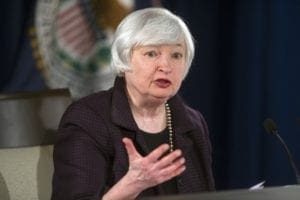Audit the Fed Could Come Up for a Vote in the Senate
This article was featured in our weekly newsletter, the Liberator Online. To receive it in your inbox, sign up here.
Sen. Rand Paul, R-Ky., announced on Tuesday several amendments that he plans to offer to the Cybersecurity Information Sharing Act (CISA), a controversial bill that could come up for a final vote in the upper chamber later this week. While most of the amendments are privacy-focused, one of them would require an audit of the Federal Reserve.
 Paul picked up the “audit the Fed” cause from his father, former Rep. Ron Paul, R-Texas, after his exit from Congress in January 2013. The amendment appears to be the exact same language of Paul’s Federal Reserve Transparency Act, S. 264, which was introduced in January. To date, the bill has 32 cosponsors. Rep. Thomas Massie, R-Ky., has introduced companion legislation in the House, H.R. 24, which is co-sponsored by 184 of his colleagues.
Paul picked up the “audit the Fed” cause from his father, former Rep. Ron Paul, R-Texas, after his exit from Congress in January 2013. The amendment appears to be the exact same language of Paul’s Federal Reserve Transparency Act, S. 264, which was introduced in January. To date, the bill has 32 cosponsors. Rep. Thomas Massie, R-Ky., has introduced companion legislation in the House, H.R. 24, which is co-sponsored by 184 of his colleagues.
The amendment Paul plans to offer – that is, if Senate Majority Leader Mitch McConnell, R-Ky., doesn’t use procedural tactics to block them – would require the Federal Reserve to give information – such as discussion between the central bank the Treasury Department and transactions with foreign banks – currently excluded from audits conducted by Government Accountability Office under 31 U.S. Code § 714(b).
“A complete and thorough audit of the Fed will finally allow the American people to know exactly how their money is being spent by Washington. The Fed currently operates under a cloak of secrecy and it has gone on for too long,” Paul said in a release on Tuesday. “The American people have a right to know what the Federal Reserve is doing with our nation’s money supply, and the time to act is now.”
The House, in July 2012 and September 2014, passed iterations of the Federal Reserve Transparency Act by strong, bipartisan margins. The Senate, then controlled by Democrats, never took the bills up for a vote.
Federal Reserve Chair Janet Yellen has firmly stated her opposition to transparency at the central bank, claiming that it would threaten its independence. “Back in 1978 Congress explicitly passed legislation to ensure that there would be no GAO audits of monetary policy decision-making, namely policy audits,” Yellen said in December. “I certainly hope that will continue, and I will try to forcefully make the case for why that’s important.”
Any attempt at an real audit of the Federal Reserve would face challenges should Congress actually pass it. The White House, in February, announced its opposition to the bill, calling the measure “dangerous.”
Created by an act of Congress in 1913, perhaps one of the worst years for liberty, the Federal Reserve holds a tremendous amount of influence over the economy. Despite the arguments against stronger audits, the power the central bank holds means more transparency is necessary. The American people have a right to know what the Fed is up to.




















